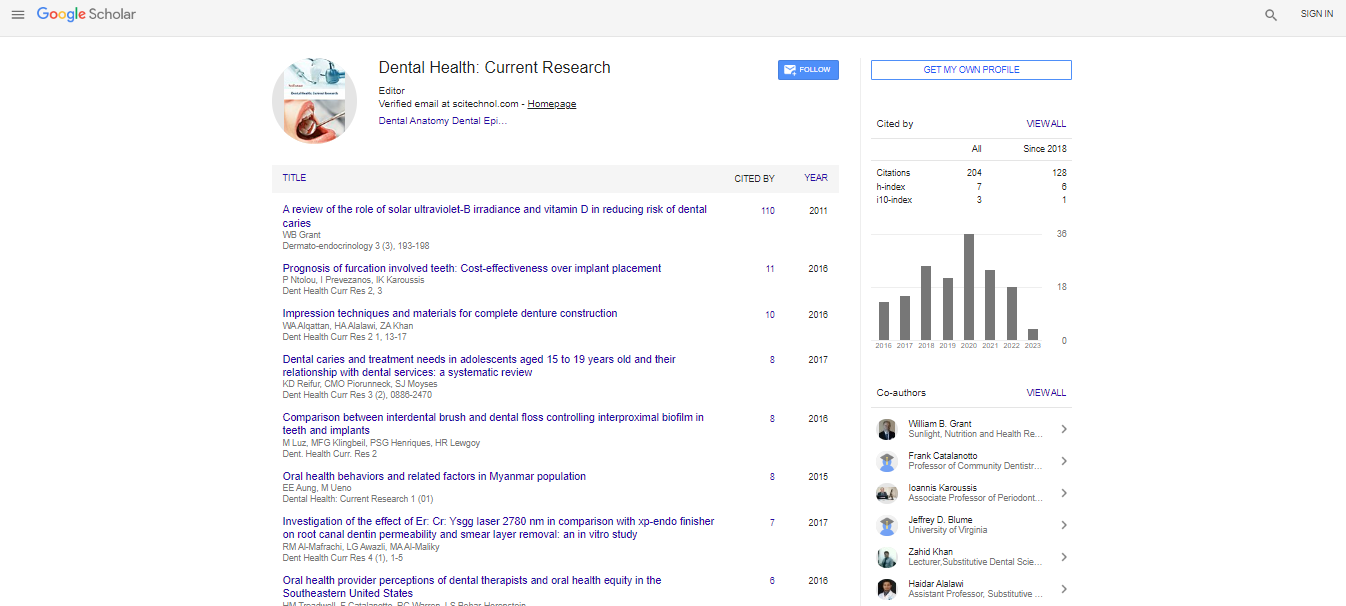Short Communication, Dent Health Curr Vol: 9 Issue: 2
Advances in Periodontology: A Comprehensive Overview
Hosseinali Gholami*
Department of Periodontology, Istanbul Atlas University, Istanbul, Turkey
*Corresponding Author: Hosseinali Gholami
Department of Periodontology,
Istanbul Atlas University, Istanbul, Turkey
E-mail: gholamihi@gmail.com
Received date: 22 March, 2023, Manuscript No. DHCR-23-98949;
Editor assigned date: 24 March, 2023, Pre QC. DHCR-23-98949(PQ);
Reviewed date: 15 April, 2023, QC No. DHCR-23-98949;
Revised date: 22 April, 2023, Manuscript No. DHCR-23-98949(R);
Published date: 28 April, 2023, DOI: 10.4172/2470-0886.1000147.
Citation: Gholami H (2023) Advances in Periodontology: A Comprehensive Overview. Dent Health Curr 9:2.
Keywords: Periodontology
Description
Periodontology is a specialized field of dentistry that focuses on the prevention, diagnosis, and treatment of diseases affecting the supporting structures of teeth, including the gums, periodontal ligament, and alveolar bone. This provides a comprehensive overview of recent advances in periodontology, highlighting key concepts, techniques, and research findings that have revolutionized the field. It covers topics such as periodontal disease etiology, diagnosis, nonsurgical and surgical treatment modalities, regenerative techniques, and the role of oral microbiome in periodontal health. By understanding these advances, dental professionals can enhance their clinical practice and improve patient outcomes. Periodontal diseases are highly prevalent and pose a significant challenge to oral health worldwide. This aims to present a comprehensive overview of recent advancements in periodontology, focusing on key areas such as disease etiology, diagnosis, treatment modalities, and regenerative approaches. By exploring these advances, dental practitioners can optimize their treatment strategies and offer improved oral health care to their patients.
Periodontal diseases are multifactorial in nature, involving the interplay between bacterial infection, host response, and environmental factors. Recent research has shed light on the role of the oral microbiome and its dysbiosis in the pathogenesis of periodontitis. Understanding the microbial profile and the host immune response can aid in developing targeted therapies for disease management. Furthermore, genetic and epigenetic factors have been implicated in periodontal disease susceptibility, paving the way for personalized treatment approaches.
Advances in diagnostic techniques have revolutionized the early detection and monitoring of periodontal diseases. Novel methods, such as chair side DNA testing and salivary biomarkers, offer non-invasive and efficient means of assessing disease activity and predicting treatment outcomes. Moreover, imaging modalities like Cone-Beam Computed Tomography (CBCT) enable three-dimensional visualization of periodontal structures, aiding in accurate diagnosis and treatment planning. Comprehensive risk assessment models incorporating clinical, genetic, and environmental factors help identify individuals at high risk for periodontal diseases.
Non-surgical treatment remains the cornerstone of periodontal therapy. Scaling and root planing, supplemented with adjunctive therapies such as local antimicrobial agents and host modulators, have shown encouraging results in managing periodontitis. Additionally, laser therapy and photodynamic therapy have emerged as novel treatment modalities, offering improved outcomes and reduced patient discomfort. In cases where non-surgical approaches are inadequate, surgical interventions, including flap surgery, guided tissue regeneration, and minimally invasive techniques like laser-assisted periodontal surgery, have demonstrated superior results in restoring periodontal health.
Advancements in tissue engineering and regenerative medicine have opened up new avenues for periodontal regeneration. Techniques such as bone grafting, guided bone regeneration, and the use of growth factors and biomaterials have shown encouraging results in promoting the regeneration of periodontal tissues. Furthermore, stem cell-based therapies and tissue engineering strategies hold great potential for the future of periodontal regeneration.
The oral microbiome plays an important role in periodontal health and disease. Recent studies utilizing high-throughput sequencing technologies have revealed distinct microbial signatures associated with periodontal health and disease. Manipulation of the oral microbiome through targeted antimicrobial therapies, probiotics, and prebiotics offers new avenues for preventing and managing periodontal diseases.
 Spanish
Spanish  Chinese
Chinese  Russian
Russian  German
German  French
French  Japanese
Japanese  Portuguese
Portuguese  Hindi
Hindi 